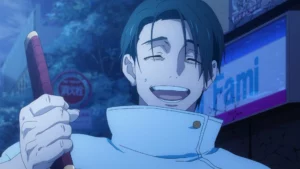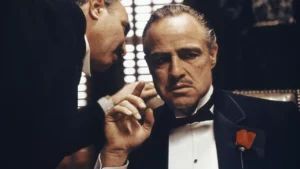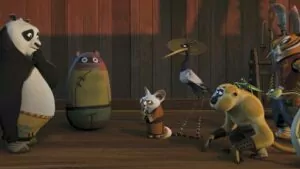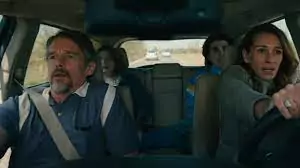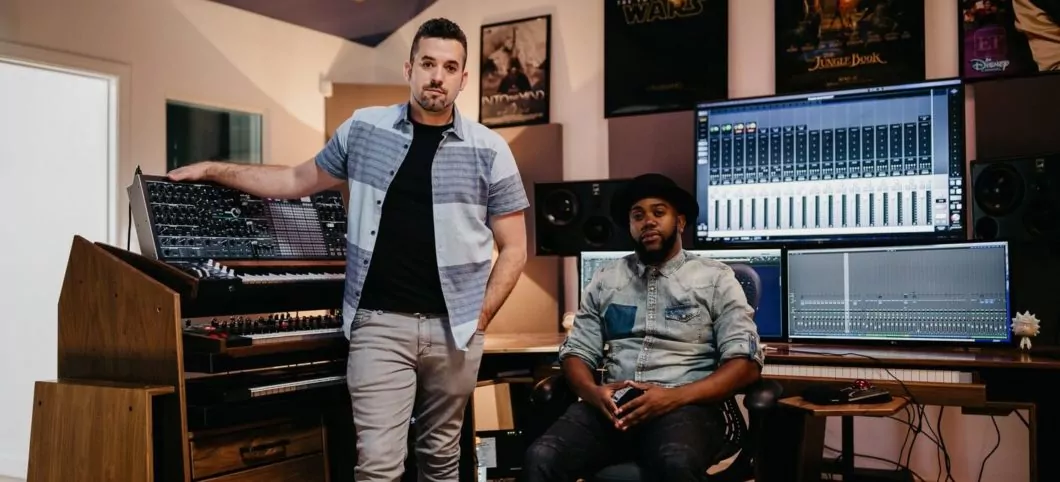
Roahn Hylton & Jacob Yoffee have been worked together on several projects for record labels, film, television and advertising. Often fusing pop, hip-hop and film score they’ve created soundtracks for several music driven projects. Currently, they are scoring The Wonder Years’ on ABC for executive producers Saladin K. Patterson and Lee Daniels, and the upcoming ‘Vampire Academy’ series created/produced by Julie Plec at NBCUniversal.
Q. Okay, So let me just start by asking how you came around to working for the title track for ‘The Wonder Years’? How did it all start?
Jacob Yoffee: Oddly enough, it actually started as just a score cue. We originally had just been writing ideas away from picture, just like, oh, let’s write some music that’s just in the world of the show. And we were in the middle of recording the band and Roahn turned to me and he said – “Man, this could be, this could be the main title song. But we got to kick the tempo up, it’s got to be faster.” And I think I was arguing with Roahn. I was like, “No, it’s fine where it is”, and he’s like, “No”. And so we got the band to stop. And we tried a couple of different tempos tracted.
And then we brought in some vocalist friends, you know, people that have been working with Roahn for years and years. And I think the first one was Scotty Grand. He came over to the studio a couple of times, and we just were all in the room together. We were throwing ideas on top, talking about lyrics, Scotty went into the booth and started riffing and improvising, and started adding layers. And then Roahn started chopping things up and placing certain pieces everywhere. And then after that, we tracked horns, put it on top. And on this album, I hope I’m not forgetting any elements, but it kind of just came together. It was like that feeling when you first start making music, where the excitement is so high.
I remember, while we were tracking, I was like jumping up and down in the studio while Scotty was recording the lead. You know, it just was had so much positive energy. I think we did like three or four other songs as well. But this one just had that feeling.
Roahn Hylton: Yeah, it was crazy. Because I remember Jacob said to me, playing the piece of music, he was like, “Man, this is incredible”. And you know, in the recorded music side, we have a thing where we just do a whole lot of music. And we find the best pieces of music that work. Scotty came first, like Jacob said, because Scotty has been a great collaborator. And as you know, they’re working with us on a couple of other pieces for the show.
We had some other friends, like Lucky Daye. He just won Grammy for R&B Album of the Year this year. Congrats to him. And Ilsey Juber, she’s written for Beyonce, and many others. And then J Angel’s written for Rihanna, all good friends. And we wrote some amazing stuff. And it’s crazy in the end. Saladin was like, “Guys, it’s the first one”.
And to be honest with you, when we were creating it, we knew, especially since the original song is iconic. So what we wanted to do was not think about the fact that it was iconic and written for the Beatles and performed by the legend, Joe Cocker. Like, we didn’t want to think about that. We just wanted to go into the studio, and have just the best time that we possibly could, and make a song from that place. And that’s how the main title came to be.
Q. So, it wasn’t just composing, you also wrote the lyrics to the song as well. How was that process of putting together everything? Between composing and lyrics, which one was easier and which one was harder?
Roahn Hylton: Oh, I think they go hand in hand. It’s a seamless team effort, like Jacob was saying. The way we usually do it is, we just all get into the room together and play the music over and over and over again. Good thing we have a legend like Scotty Grand who could sing amazingly, and make our ideas sound like they’re actually good. Because if it was me or Jacob in there, you know, it might not have been great.
Jacob Yoffee: I remember one challenge was that we had some lyrics that we altered. It’s really easy in a situation like this, you got the original series, then you also have the fact that the show takes place in the past. But see, there’s the catch, because we are experiencing it now. And the showrunner, who’s brilliant, smartly told us our original path was reflective. It was looking back.
And so we had to change things to present tense. We had to change things to feeling like they’re in the moment, like this is a universal time. The Wonder Years are for everybody. So when we changed the tense and changed a couple of lines, it just kind of crystallised. And it just felt like – Oh, wow, this feels urgent now. This could be applicable to anyone, anywhere, anytime. Which I think is the main point of the show, it’s about this family, but the tone and the storyline and everything, we all can relate to it.
Roahn Hylton: One last thing, there’s a famous line that says great songs aren’t written, they’re rewritten. And I think that was very much the case here.
Q. Is there a lot of research that goes into writing and composing for songs for a series or show, as in do you have look into the plot lines and the characters?
Roahn Hylton: Yeah, I would say yes. But you also don’t want to overthink it. You know, I think you don’t want to be too on the nose. I think that’s why we’re able to actually land it right. Because we didn’t want to, you know, have a lyric like – ‘this is a coming of age story’. You want it to feel like what the show is, not be what the show is. I mean, it has to make room for what the show is. And I think we accomplished that. And not that we don’t do research, you know, we want to see what’s going on, we want to see what it looks like, feel that images and the energy. But as far as the main title goes, I would say we just didn’t want to overthink it.
Jacob Yoffee: Yeah, we end up doing a lot of songs for the shows that we work on. And you just start to realise that there are familiar traps. You know, especially lyrically, if you’re too on the nose, it kind of kills the energy. It draws too much attention. And what’s really interesting to me personally, I don’t hear lyrics right away. It takes me a couple of listens before my brain pays attention. I hear the chords and the melody, but Roahn hears the lyrics right away.
So we’ll be working on an idea. And he’s like, “That lyric doesn’t work.” And I was like, “Wait, what? No, but it sounds okay.” He’s like, “That lyric doesn’t work.” And so it makes me realise how much people can be different. And how important the lyrics have to be, kind of alongside what’s happening, but not directly on top of or like explaining what you’re seeing?
The equivalent would be like Mickey Mouse-ing. And have you heard that term? Where it’s the film scoring no-no’s where, back in the old Mickey Mouse and Looney Tunes cartoons, every time someone moved, you would do like a *mimics cartoon background noise*. It’s like, literally, you are Mickey Mouse-ing that person’s movement on screen. That’s the last thing you want to do. Same thing here with songs.
Q. If you have to encapsulate the overall theme or meaning of the song ‘All I Know’ in one word, what would it be and why?
Roahn Hylton: I’ll say Family, because that’s what we wanted the song to feel like, right? That it’s a family. All I know, is we’re gonna stay together no matter what’s going to happen. You know, love is hard, war is easy, but all I know is we’re gonna be together forever.
Jacob Yoffee: I like Roahn’s answer better than mine. I felt like Heart because we just wanted to hit you in the heart. But his is much more poignant. And yeah, I like that. We’ll go with that, Family it is.
Q. Like you mentioned, with the original ‘The Wonder Years’ show of 1988, the original theme song was pretty popular, also owing to the fact that it was a Beatles song. So when you were working on it, did you face any kind of initial intimidation or reservations?
Roahn Hylton: Yeah, like I was saying before, I mean, that’s one thing that everybody knows about that show, right? That’s the one thing that every single person you know remembers about ‘The Wonder Years’ is the theme song. And in fact, most people who don’t even know the lyrics or will mess the lyrics up, but they know ‘what would you do mumble…mumble…..mumble’.
I’ve written a lot of songs in my lifetime and like I was saying before, when you have to either write for a legendary artist or replace something that a legendary artists does, you literally just can’t think about it. I just don’t want to think about Paul McCartney and John Lennon. I want to go in there and feel as good as I can about the material that I’m making, and get legendary collaborators with me, who we can prop up each other with great energy and great talent, and throw as many ideas that we feel are great against the wall until something kind of happens.
I was talking to a brilliant composer yesterday as a matter of fact, and he was just saying that the great scores or the great songs are always there, you’re just kind of removing all the noise from it. And I thought that was brilliant. It’s like a sculptor, right? The statue was there, but you’re removing all the rock or whatever material you’re using away from it. And I think the same thing here. I think resistance is thinking about John Lennon. So I would prefer not to have any resistance. But yeah, it was it an honour when we first found out that, hey, you guys have a shot. We’re like, oh, we got to do something great. That was the moment. But then when we’re in the studio it was like, let’s just be.
Q. The song was also incorporated in one of the episodes of the show. So how was the process of that?
Jacob Yoffee: Well, the showrunner showed us real love. And if you’ve watched the show, outside of a handful of episodes, you only get to hear ten seconds of the theme song. And Saladin, he wanted audiences to get more of a taste of the song. So he fictionalised within the world of the show how the song came to be. So you get to see characters in the show write the song on camera, they’re sitting side by side on the piano. They kind of argue about lyric choices and chords.
And then you actually get to hear it performed, I think three more times in the episode by different singers, different styles. Before the very end, it ends up being kind of like a montage medley where both parents sing it. And it’s very heart-warming, I’d say. And I mean, it was just a thrill. But also, it really tested our theme song, because often you can have a piece of music that you create, and you really don’t know if it’s durable, like if you start pulling the strings. Does it still sound like that piece of music? Does it have a strong enough melody? Does it have strong enough chord movement to be recognisable once you start changing a lot of things, like different instruments, slower tempo, all that.
Thankfully, it stood up. And then it was crazy, because we got to bring the cast members over to our studio, we were working with the actors and changing the keys and just trying different things. I mean, it was like the thrill of a lifetime, really, just to have that opportunity to kind of take something we’d created and be given the gift of this episode to work with. I don’t know how often that happens. I’ve never heard of it before. But yeah, we’re cherishing every moment.
Roahn Hylton: Yeah, definitely big shout out to Saladin, such an honour he gave us. I think one of the other things I wanted to say is, what was cool about it is that Saladin comes from a musical family. So he understands the process. And it’s funny, because if you’ve seen the episode, you know that Bill and Lillian, played by Dulè Hill and Saycon Sengbloh respectively, they played the scene well, but they’re literally conflicting over the lyrics.
And it’s funny because the lyrics that they’re conflicting over bring some of their relationship tension, and so it fictionalises the song, but it also gives the main title a deeper meaning, because even though they’re fighting, all they know is they’re gonna stick together through every storm, and that episode had a storm in it. So really cool of Saladin to give us that opportunity to tell a story about our main title, and to hear Dulè and Saycon sing the song was also phenomenal.
There’s another version. It’s really cool. We did a really slow, sultry, R&B version that has these cool background vocals that Saycon killed, and Dulè Hill too. It was a joy to do that version. And then there’s another version that didn’t ended up making it in. If you want to know a little trivia, Saycon Sengbloh also was a co-star in ‘Respect’, the Aretha Franklin’s movie, her story with Jennifer Hudson. And I asked her, I was like, “Hey, Saycon. Give me an Aretha vocal.” And she went crazy. And that was the version that I wanted them to use. And somehow, someway, it just didn’t end up being the one. But hopefully one day we’ll get to unearth these Easter egg musical pieces. But again, it was a joy to work on, couldn’t be more happy with how it came out.
Jacob Yoffee: I want to say, these types of episodes where you have onscreen performances with the cast, different locations, and you’ve got musical instruments on screen, and we have to prepare music ahead of time, those episodes normally can be just a disaster and take tonnes of work on the post process, like rewrites, and just a lot of fixes, and they end up coming out kind of clunky.
But this one was totally smooth sailing, I think it was the quickest process we’d ever had. Because the cast was so good. And they did the pre-production, they rehearsed and it came off without a hitch. I think it was like one of our easiest episodes in the end, which is just wild to think about. So, yeah, a little more trivia for you.
Q. The two of you have had a lot many collaborations before this, successful collaborations at that. So how was it working together the first time and how is it different now?
Roahn Hylton: Great question, actually. The very first thing we did technically didn’t ever come out. When Jacob and I met in Israel, at that time, I was working on a Kendrick Lamar album. And I know, his jazz and classical background would have been amazing for that specific album. And, you know, we just wanted to find a way to work together. And so when we got back, I came to his studio, he came in my studio, and we were just trying to find a way to collab. And then I got called in to do an indie film. And at that point, I hadn’t done film yet. But we kind of trailerised some themes, worked on a little bit of the score, but the movie ended up not coming out.
And to be honest with you, during a lot of that, I was still in producer mode, I don’t think I had fully understood what the difference between producing and composing was about six, seven years ago, and I would say, by the first series that we actually did, which was Best Shot, that was like a crash course, like – Okay, this is what is there, and this is what doesn’t work and does work.
Again, I referenced a great, great conversation I had last night, we’re talking about working to picture. And one of the things that, we were saying is that the picture will literally fight you. And it’ll tell you what you can do and what you can’t do, it’s like judo, right? Eventually you find out that oh, this works. Oh, that works. And I would say the difference between then and now, is that now I kind of relax and I don’t fight with the picture, right? I would say all these years in Jacob and I creating a musical language together, like sitting side by side.
And I would say now, as opposed to then, it’s just a lot more seamless, because we also can anticipate what each other will think, we know each other’s styles very well. And we also know each other’s strengths, and how to overcome each other’s weaknesses. So it’s just been a blessing.
Jacob Yoffee: Yeah, there’s the benefit of having two minds. When you talk about objective and subjectivity, I think it’s a benefit to have both of us watching a scene. And you kind of have a natural inclination towards like – oh, the pacing, should this be a big piece of music or should it be subtle? How heavy handed should we be? Like, do we need to push the tempo faster? And we’ll both feel differently about it, which is great, because then we try both ways.
And then, sometimes one of us is more reluctant. And then we have to kind of sell it to each other. So whatever we end up sending to the producers, we both believe in it. And it kind of already goes through that first test of having someone else judge it. We were working on something yesterday and we sent it out and then we got a note back, and it was something Roahn had said no to, and I was like- No, that’s fine.
Turns out it wasn’t fine. And Roahn was right. I was wrong. So we got to jump and fix that. But it’s really great, and it also just keeps the energy going. We’ve learned so much working with each other. And we’ve got six, seven years with the music we’ve created, so we can reference our own work. We will be like- remember when you did this, remember when this happened wherever we did that. And it just helps us kind of build on top of what we’ve already created. So yeah, really, I’m a fan of the duo process, I think it’d be really hard to go back to working solo ever again.
Q. Aside from ‘All I Know’, out of all of your collaborations so far, which one was the most memorable for you?
Roahn Hylton: Oh, wow. That’s, that’s a hard one. You never forget your first time, I would say that. Our first project, ‘Best Shot’, which was a LeBron James show, just, it had so much energy. And I think, obviously, so much excitement and enthusiasm. And part of it, you know, it was my first series, I didn’t know any better. He’s like, bro, we’re getting away with stuff that we’ll never get away with.
Funnily though, we still have been getting away with some of those same things. But I would say that, obviously, The Wonder Years is current, right? So I wouldn’t say it’s memorable. It’s been the most fulfilling, right? The Wonder Years is by far the most fulfilling, but memorable, I would say is our first one, just for so many reasons. Obviously, it was our first one, it came out amazing.
Together, we really lifted the energy that was around the project. And to this day, we still get compliments on the wild mix and collaboration of sounds. It was really a blend of jazz score, hip hop, and some classical pieces. It was really interesting music. And I think today we wouldn’t make the same choices that we made back then. But I think that because we did that project. Now we’re building off of that kind of collaborative effort.
But obviously, ‘The Wonder Years’ is a dream come true. I would say even the way that ‘The Wonder Years’ has happened since 2020. We just bet on ourselves in 2020, we didn’t know what was going on in the industry, in the world. And so we just made an album. And that album happened to be the same sound. And a lot of that was used in the early materials of the pilot of ‘The Wonder Years’. So this holds a special place in our hearts. So we’re thankful for where we are and where we have been.
Jacob Yoffee: And I’ll say, when you think about things being memorable, that was actually a kind of a question that we got asked that ended up kind of driving us to define who we were a little more clearly, right around, I think it was 2018 or 2019. I’m losing the memory here. But we were working on a show called Free Meek about Meek Mill, Jay Z’s series on Amazon. And we were really working to create a fusion of Meek Mills music, hip hop, sort of like the energy and the sound of the civil rights era, the sixties. And we came up with like a piece of music that kind of recalled both.
It was like a pretty successful melding of jazz and gospel and hip hop and film score. And so we eventually landed on the name Third Stream, our company’s name is Third Stream, which is a Miles Davis Gunther Schuller quote, from the mid-twentieth century. And the story goes, they were making a fusion of jazz and classical and it pissed off everybody, none of the jazz people were happy. None of the classical people were happy. Miles Davis, in true Miles form, said something like, we’re making a third stream of music that is fusing everything together. So you guys need not to concern yourselves.
That’s kind of been our mission statement ever since that, every time we work on something, we want to make sure that when we’re sitting side by side making music, it is something truly new and unique, and force ourselves to kind of get out of our comfort zones. And I would say that Free Meek was my favourite, so far the most memorable, because that kind of drove us to define a little more clearly who we are. Which of course has now led to ‘The Wonder Years’, which is awesome.
The Movie Culture Synopsis
The Wonder Years is an American coming-of-age comedy television series. It premiered on the ABC on September 22, 2021. It is inspired by the 1988 series of the same title. It is developed by Saladin K. Patterson and stars Elisha “EJ” Williams, Dulè Hill and Saycon Sengbloh in lead roles. In May 2022, the series was renewed for a second season. The series is also available on Disney Plus.
